Wow, That Golden Horde. I have to say, I hope they don't gobble up Poland and Hungary, they'd be knocking on your doorstep then.

The rise of the Hohenzollerns, 1192-1399: A mega campaign beginning CK2 AAR
- Thread starter Avindian
- Start date
-
We have updated our Community Code of Conduct. Please read through the new rules for the forum that are an integral part of Paradox Interactive’s User Agreement.
You are using an out of date browser. It may not display this or other websites correctly.
You should upgrade or use an alternative browser.
You should upgrade or use an alternative browser.
Oh wow that war of succession must have been difficult! Did you get out as a winner (I am asking since there are so many hostile i.e. "red" armies)?
Well, "winner" is a funny word. We'll just say I didn't lose.
Which dynasty is the new Kaiser of?
Also, isn't it a bit of a pity that you do not have the historical dynastic shields?
Anyway, I guess that the Bohemian independence won't last long...
I believe they're sticking with multiple people in the same dynasty. As to what dynasty, your guess is as good as mine.
It would be really disapointing if Reinhard gets murdered before my character gets to do anything. How many sons does Max have before him?
At this stage, Max's children are Berchte, Michael, Reinhard and Gerlinde (in that order.)
Wow, That Golden Horde. I have to say, I hope they don't gobble up Poland and Hungary, they'd be knocking on your doorstep then.
It's pretty impressive, no doubt about that!
Well I have a character finally. Woohoo.
Don't forget me.
I promise I won't; I've flagged all player characters as "interesting" now.
I believe they're sticking with multiple people in the same dynasty. As to what dynasty, your guess is as good as mine.
The McSweeneys. They're a very old established family.
At this stage, Max's children are Berchte, Michael, Reinhard and Gerlinde (in that order.)
As the official appointer of Maximilian I (hehe), I'd like to see some kind of settlement that gives Reinhard the crown.
You know, to keep the church happy. And Cezaire
The McSweeneys. They're a very old established family.
Could be.
As the official appointer of Maximilian I (hehe), I'd like to see some kind of settlement that gives Reinhard the crown.
You know, to keep the church happy. And Cezaire
You'll just have to see what happens.
Chapter 23: Blood begets blood
4 September 1353, Schwaben
Max von Hohenzollern, Herzog von Bayern, didn't hesitate for a second once he realized how vulnerable Schwaben was. He ordered Chancellor Robert to immediately declare war on the Duchy and mobilized his levies for war.
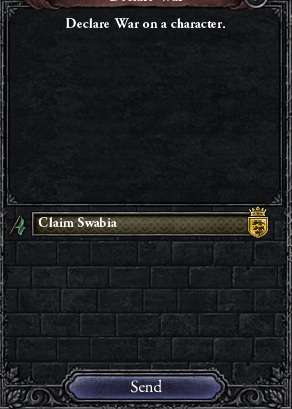
If Schwaben had been alone, the war would have presented an insignificant challenge to the Hohenzollerns. However, Herzog Baldemar III von Schwaben called in the Herzog von Böhmen, the Graf von Fürstenberg, and the Graf von Brabant. The single ally Max had to call upon was the Baron von Hohenburg, who could not oppose his own liege lord. This political atmosphere created a much more difficult task for him. His own domestic affairs were somewhat fragile as well; Gerhard had acquired the Barony of Straubing. Max, with little choice in the matter, left Robert Capet in charge of affairs in Nürnberg and marched off to war. His plan was simple.
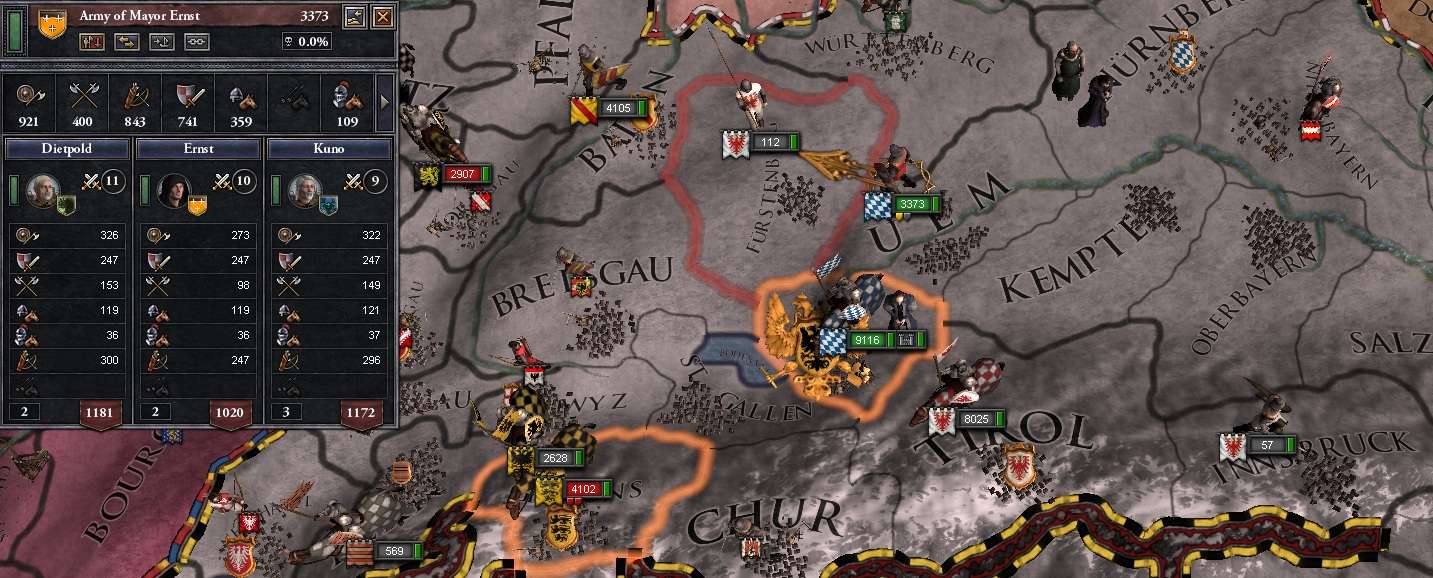
The largest concentration of enemy forces lay in the province of Grisons. Max and Marshal Gebhard would attack the main enemy stronghold at Schwaben, which would either freeze the enemy army to the southwest or encourage a foolish assault; either was acceptable, even desirable. A smaller force, led by one of Max's Mayors, would attack Fürstenberg and prepare defensive positions in case the Graf von Brabant decided to attack there. More importantly, the two Hohenzollern armies firmly shut the door on a direct assault on Hohenzollern lands. Max had money, time, and larger forces. All he had to do was be smart with his men and somehow prevent a coup while he was away.
For that, it was up to Chancellor Robert and Spymaster Konrad.
29 March 1354, Vodi
Michael von Hohenzollern was losing patience with his father. As heir to the throne, he ought to have at least been consulted on the affairs of the Hohenzollerns when the Herzog knew he'd be away. Instead, his father trusted a foreigner and a mere Mayor over his own blood. That Michael had done nothing to engender trust with Herzog Max was beside the point. It became increasingly clear that without drastic action, Michael might never see his inheritance. That was when he'd heard about the incident in Schwaben.
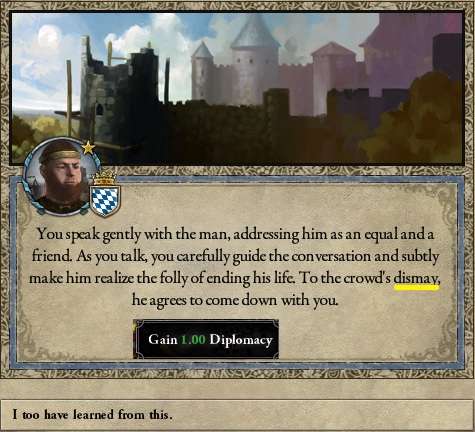
The one thing Michael was better at than his father was diplomacy, but convincing the man not to kill himself demonstrated that Max was willing to improve even this limited liability. Michael, a cautious sort, spent a couple of days with his Spymaster in Vodi to determine how vulnerable his father would be. Unfortunately, Konrad caught Michael's agent and told Max.
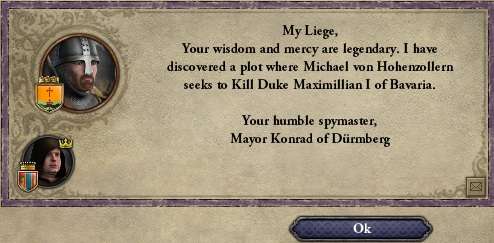
The Herzog von Bayern wasted no time in drafting a letter to his son, demanding an apology and that his son cease all clandestine opportunities. Michael acquiesced, and knew that his opportunity had passed, perhaps for good. Still, Michael wouldn't give up, and began exploring other opportunities. As he sipped thoughtfully at his wine, a muffled knock announced the arrival of his expected visitor. Michael's guest was one of the finest assassins in all of Europe. He had no name -- he needed none. In fact, rumor had it nobody had ever even heard his voice. He approached you, handed you a piece of paper with the fee for the job. He already knew your target, as he was exceptionally well informed. Michael expected the very best from this assassins, and had set aside a sizable chest of thalers in anticipation of his cost.
The assassin bowed slightly to Michael and reached into his robe. Michael turned to open the chest. He never saw the knife coming.
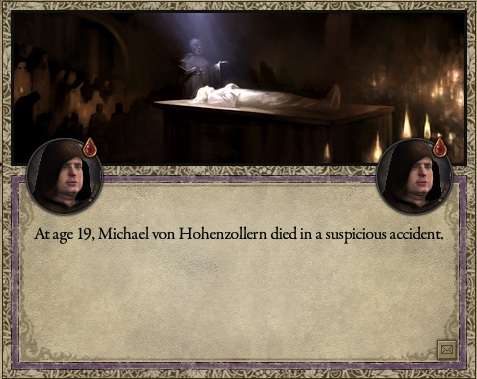
The assassin's skill was exceptional; his cut looked like an accidental knife wound from cutlery. He wiped his blade and briefly admired his work. He glanced at the chest for a moment, but shook his head slightly. Robbery was beneath him, and he'd been paid handsomely for his work.
28 October 1355, Schwaben
Max von Hohenzollern was grieved to learn of his son's death: news of his uncle's death, however, was more welcome.
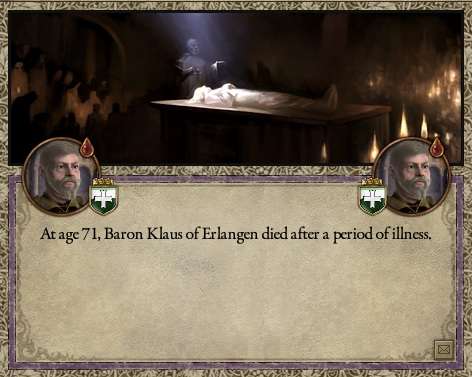
Klaus died a bitter old man, hating everybody he'd ever met. The former Steward could never muster the courage to seize power for himself, relying instead on his considerable personal fortune to influence others, like Max's nephew Gerhard.

While Michael had been a threat to Max, Gerhard was much more dangerous. He was smart enough not to seek rule in his own name; instead, the brilliant Marshal Gebhard, Max's brother, was the figurehead of Gerhard's faction. That Gebhard had finally seized the castles of Konstanz and Fürstenberg only added to his prestige. Making matters worse, Gerhard had cleverly insinuated that Max had killed his own son, Michael, and was thus a kinslayer and unworthy of respect. This particular rumor was so nasty because it happened to be true; Max had indeed paid for the assassin that had ended his son's life. 250 thalers was a small price to pay for the Hohenzollern legacy, and even if Max became the most hated figure in history, that was okay too. All that mattered was Bayern, and Michael was a threat to it. That didn't mean Max wasn't devastated, but sacrifices had to be made for the greater good.
The very fact that Gerhard at least put the notion in people's minds made dealing forcefully with him an unattractive option. Defusing Gerhard's challenge to the throne would require more skill and subtlety. Max needed to isolate Gebhard and Gerhard; therefore, the war had to continue as long as possible. Without Gebhard's open support or the ability to communicate, Gerhard could be safely ignored.
Of course, Max didn't intend to ignore him forever.
22 March 1356, Locarno
Although Max hadn't believed it, the one person whose loyalty was absolutely unquestioned was Gebhard's. Max had no way of knowing that Gerhard's little faction was entirely founded by his own devising. A long strategy session and a frank discussion changed Max's mind; he no longer needed to draw out the war simply for domestic security. Gebhard had been begging for a direct assault on Locarno for weeks, especially with Schwaben and Fürstenberg completely under Hohenzollern control. On 4 February, Gebhard got his wish.
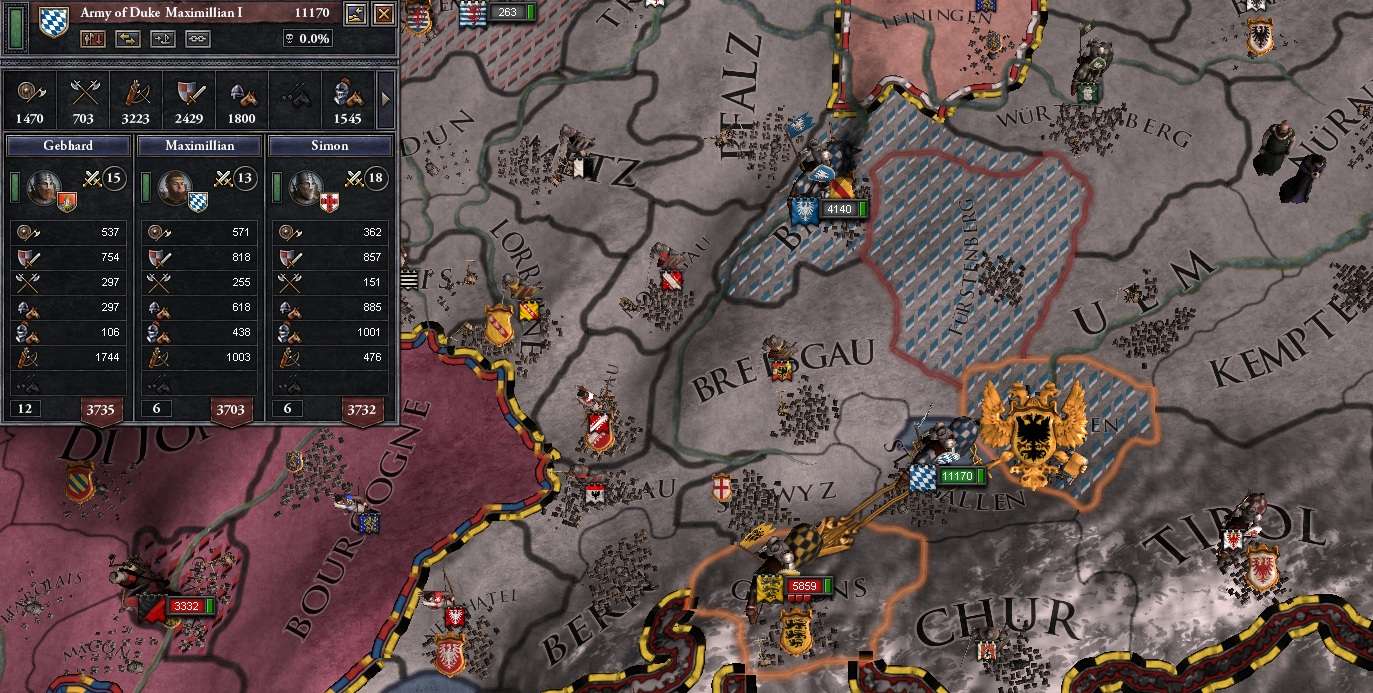
Attacking Locarno was a bold move. It was not only well fortified, but situated in dangerous terrain. Max's skill at leading mountain operations would prove handy; although Locarno itself was not in the mountains, Max was able to take a sizable contingent of archers to the high ground quickly and quietly, surprising the defenders. Gebhard's own archers fired from level ground, but were no less effective thanks to their greater numbers. Grandmaster Simon of the Templars took his cavalry and sealed off the enemy escape route. The result was a total victory.
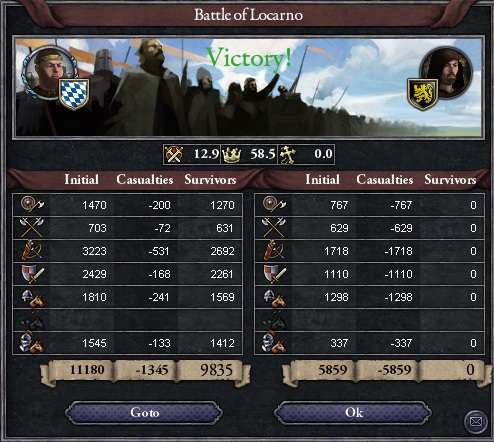
The Herzog von Schwaben refused to surrender, even with no forces in the field. This was little surprise to Max -- Ordulf II, the new Herzog, was a Wittelsbach, after all. Still, only a few fortress remained in the Duchy of Schwaben. It was only a matter of time before victory was at hand.
1 January 1358, Schwaben
Gerhard von Hohenzollern didn't often leave Niederbayern, but when Max requested his presence in 1356, Gerhard had no choice as Max's vassal. Gerhard half expected to be assassinated, as his uncle Michael had been. Instead, Max appointed Gerhard as ambassador to Braunschweig, where once again another attempt was made to seize the Duchy for the Hohenzollerns. Although it failed, the assignment was a clear signal that Max had regained some trust in his nephew.
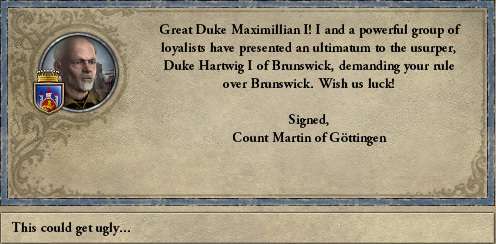
As a reward, Gerhard was named High Almoner of Bayern and given a sizable chest of thalers. (The chest had, in a delicious bit of irony, been Michael's, although Gerhard didn't know it. Max had "appropriated" his dear son's treasure for "the good of the realm.") Fortune would gain him respect, or at least the appearance of respect, and Gerhard publicly denounced the faction he himself had founded. Without Gerhard's leadership, it quickly collapsed. This decision -- to accept the gold and a lesser but still meaningful role within the Hohenzollern realm -- incidentally saved Gerhard's life as well, as Max had secured the backing of some powerful nobles to sponsor another assassin. Not enough to act, but that, too, would have only been a matter of time.
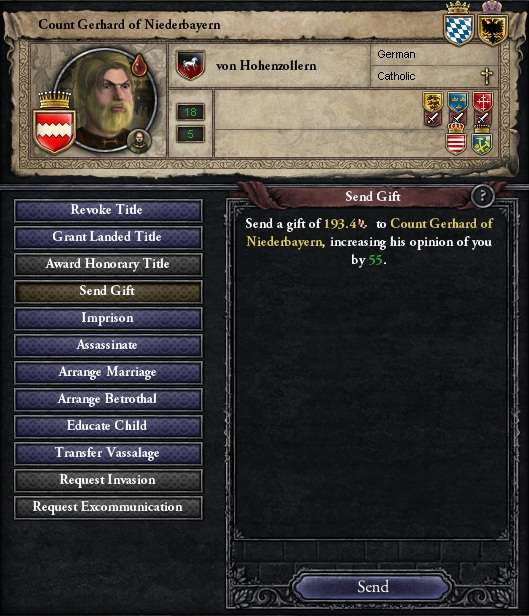
Gerhard also helped Max choose a new steward when Baron Reinhard, Max's son's namesake, died in June of 1356. The new steward, Ernst, Mayor von Ortenburg, wasn't the only Mayor to find a prestigious assignment. Mayor Simon also was given the honor of educating the younger Reinhard. Max wanted to make sure his son -- and now heir -- didn't learn his father's bad habits. That Gerhard was not asked to educate the young heir proved that Max still didn't trust him 100%. Still, with domestic peace secured, Max and Marshal Gebhard were able to finally force the ex-Herzog von Schwaben to make a peace.
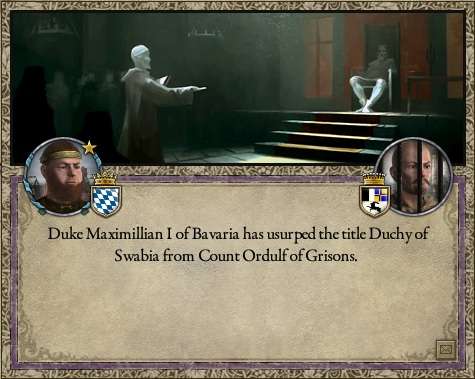
There was only one remaining threat to Hohenzollern legitimacy and safety, and now Max could turn his full attention to it.
11 June 1358, Pisa
Robert Capet, Chancellor von Bayern, had never been so relieved to be out of his adopted homeland. His liege, Herzog Maximillian, had gone from conquering hero to the most hated man in all of Europe in under six months. Robert simply couldn't explain why His Grace had done what he did. He'd taken reasonable steps to deal with a serious problem, then stretched them one step too far.
If anybody was at fault, Robert, supposed, it was Berchte von Hohenzollern, Max's oldest child. While Gerhard had accepted Reinhard's succession to the throne, Berchte could not. It had taken every bit of Robert's cunning to convince Berchte to return home, but hours after her arrival she was under arrest.
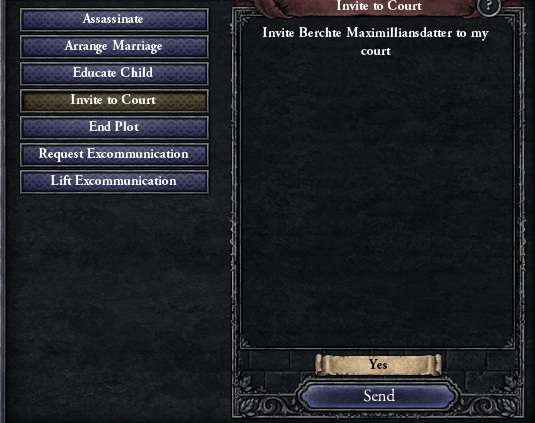
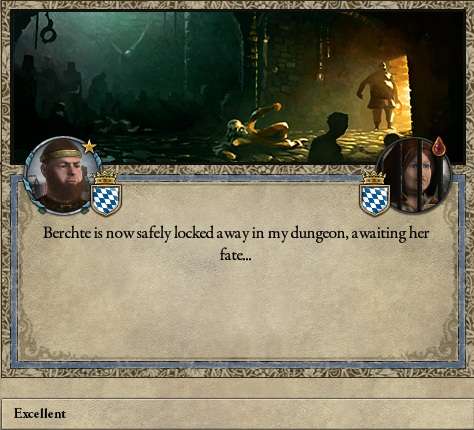
Although the sovereigns of Europe still were shocked by the swift justice brought upon the oldest child of the most powerful Herzog in the Empire, Max had proof of her complicity in a plot to assassinate Reinhard. Berchte even confessed. It seemed like Reinhard's path to succession was now to be smooth and uninterrupted.
That wasn't enough for Max, though.
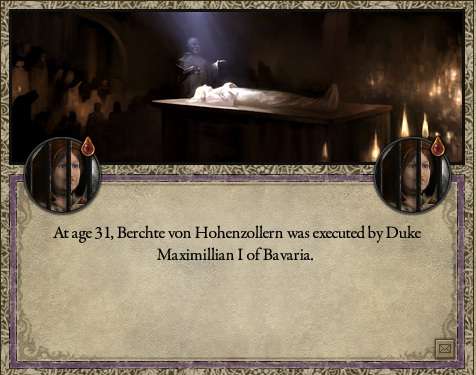
With one stroke (actually three) of the executioner's ax, Maximillian von Hohenzollern became known as "Kinslayer" throughout Europe. Whatever Berchte's crimes, they did not merit death in the eyes of most European nobles. Max insisted that he had done it only to protect his son, but nobody believed that vengeance played no part. Max's shocking brutality finally brought an end to any thought of any resistance against him. Even Gerhard was downright docile when he was "reminded of his duty to his liege."
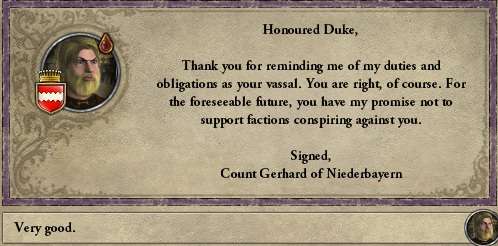
As the Chancellor prepared to deliver a declaration of war to the Duke of Pisa, he could only shake his head at his liege's seeming derangement.
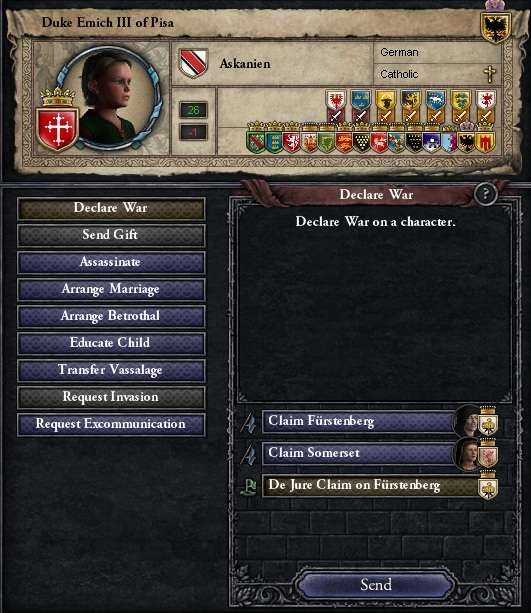
Robert couldn't help but pray for Maximillian's soul. It would certainly need it.
Honestly, when I decided to execute Berchte, I genuinely thought he wouldn't be Kinslayered as a result (since she was a traitor.) My mistake.
Another update should be coming early next week; possibly earlier, but I don't guarantee anything.
Wonderful update! And I like Max's style!
Also, who the heck is the 'Herzog von Böhmen'?
And I really liked the event that other nobles rose in a Duchy to grant it to you. I am yet to see something like that.
Anyway, I would like to ask here - in my game I have found out that using only two columns in an army actually leads to better results than having a centre with two flanks...what do you think?
Also, who the heck is the 'Herzog von Böhmen'?
And I really liked the event that other nobles rose in a Duchy to grant it to you. I am yet to see something like that.
Anyway, I would like to ask here - in my game I have found out that using only two columns in an army actually leads to better results than having a centre with two flanks...what do you think?
Ouch, Max is in a kin slaying spree, isn't it ?  And ironically the only that survives is the one that actually dared to conspire against him
And ironically the only that survives is the one that actually dared to conspire against him 
Anyway, gameplay wise, you are in a good run for the Bavarian crown. The buttering of Gerhard surely hurt your finances a little, but surely you had enough cash for those claims. BTW I'm seeing a awful lot of independent people around you : atleast Bohemia and Burgundy. Did the Kaiser lost the wars and they became independent or the war is still raging ?
P.S TBH I did not thinked you would actually go to Michael throat like I suggested... but all is for the greater good of Bavaria , I assume *evil grin*
Anyway, gameplay wise, you are in a good run for the Bavarian crown. The buttering of Gerhard surely hurt your finances a little, but surely you had enough cash for those claims. BTW I'm seeing a awful lot of independent people around you : atleast Bohemia and Burgundy. Did the Kaiser lost the wars and they became independent or the war is still raging ?
P.S TBH I did not thinked you would actually go to Michael throat like I suggested... but all is for the greater good of Bavaria , I assume *evil grin*
Wonderful update! And I like Max's style!
Also, who the heck is the 'Herzog von Böhmen'?
And I really liked the event that other nobles rose in a Duchy to grant it to you. I am yet to see something like that.
Anyway, I would like to ask here - in my game I have found out that using only two columns in an army actually leads to better results than having a centre with two flanks...what do you think?
Duke of Bohemia. I didn't actually know you could have only two columns, so I'll leave that to others better qualified.
Max is a dick.
Succinct, but true.
Ouch, Max is in a kin slaying spree, isn't it ?And ironically the only that survives is the one that actually dared to conspire against him

Anyway, gameplay wise, you are in a good run for the Bavarian crown. The buttering of Gerhard surely hurt your finances a little, but surely you had enough cash for those claims. BTW I'm seeing a awful lot of independent people around you : atleast Bohemia and Burgundy. Did the Kaiser lost the wars and they became independent or the war is still raging ?
P.S TBH I did not thinked you would actually go to Michael throat like I suggested... but all is for the greater good of Bavaria , I assume *evil grin*
I had a good pile of cash, so it was worth spending. The Kaiser is in no wars at present, so those folks have all won independence.
Can I make a small request? On the first post with the names could you maybe bold the name of the character chosen and then maybe put a (born-death) post after the names? If you are feeling up to it maybe you could also put links to both the born and death date to the post where each happened?
Can I make a small request? On the first post with the names could you maybe bold the name of the character chosen and then maybe put a (born-death) post after the names? If you are feeling up to it maybe you could also put links to both the born and death date to the post where each happened?
That'd be a decent bit of work; I can't do it tonight, but maybe tomorrow. I'll bold the names now, but if someone can track down the years characters are born/died (as far as I've mentioned it in the thread), that'd save me a lot of time.
Duke of Bohemia.
Yeah, I know how that translates but I thought that Bohemia is independent and AFAIK independent countries cannot be called into war by vassals of others?
Yeah, I know how that translates but I thought that Bohemia is independent and AFAIK independent countries cannot be called into war by vassals of others?
Well, he was called into war. That's all I know!
Also:
Congratulations!
Thanks!
Chapter 24: The Papacy and the price of redemption
23 July 1359, Nürnberg
It had been over a year since the war against Pisa began. It was not a very challenging war; Fürstenberg was struggling, but Pisa was very far away and unlikely to pose a direct threat. Maximillian von Hohenzollern's involvement in the war against Schwaben had been critical, but given the stain on his reputation, Max had wisely left the new war in Gebhard's capable hands. Max intended to spend his remaining years in quiet reflection, but he simply couldn't look his wife in the eyes any more. Ragnhild had been nobility her entire life, and understood that leadership meant sacrifice, but that in no way made her husband's assassination of two of their children acceptable. After a long talk, Max and Ragnhild decided divorce would be the best solution. Pope Hormisdas I granted his blessing.
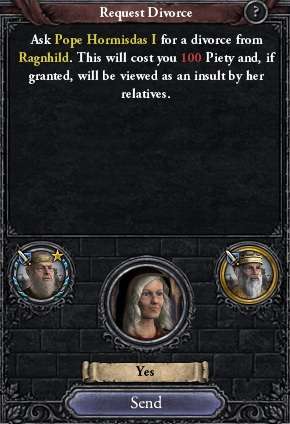
It was strange to Max that, of all people in Christendom, the least judgmental was the Pope. Granted, Max had kept his Court Chaplain almost constantly in Rome for his entire tenure as Herzog, but it wasn't that. No, the Pope genuinely understood why Max had done what he did. He didn't condone the Kinslayer's actions, but at least he was prepared to forgive him. Max expected he would stay single for years; indeed, he thought he deserved it. If he were anything but the Herzog von Bayern, he would have become a monk. Two miraculous things happened on 16 July, a week earlier. First, the fortress at Fürstenberg fell. Second, he fell in love for the first time in his life. He'd enjoyed Ragnhild's company, but never felt anything approaching love. They were comfortable. That's perhaps the best way to describe it. Not so with Emelenine, Princess of Sicily.
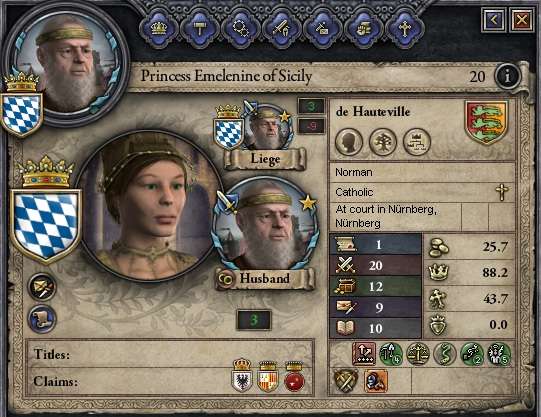
There was a significant age gap between the two -- Max was 52, while Emelenine was 20 -- but Max found her intoxicating. She was brilliant, and perhaps the finest warrior Max had ever met. She was virtuous, lovely, but with enough of a dark side to keep things interesting. Max had thanked God over and over again when he'd gotten her reply. Hot tears ran down his eyes as she was crowned Herzogin von Bayern. With his new wife, he even noticed people stopped calling him Kinslayer, which was the most miraculous thing of all.
11 March 1360, Fürstenberg
Gebhard von Hohenzollern had had just enough time to come to his brother's wedding before returning to the campaign against Pisa. All of Fürstenberg's fortresses had been taken, but the Duke of Pisa refused to surrender. Only the death of Max's step daughter, Richenza, of the fever had delayed his journey south. Richenza had spent most of her life in Vodi, along with Michael, so neither Gebhard nor her step father had spoken with her much, but there were still duties to perform.
The whinny of Simon's horse brought Gebhard back to the present. The three columns were led by the finest generals in the realm. Simon, the Mayor of Ulm accompanied the right flank, with Marshal Gebhard on the left. The center was taken by Diether, the Mayor of Fürth.
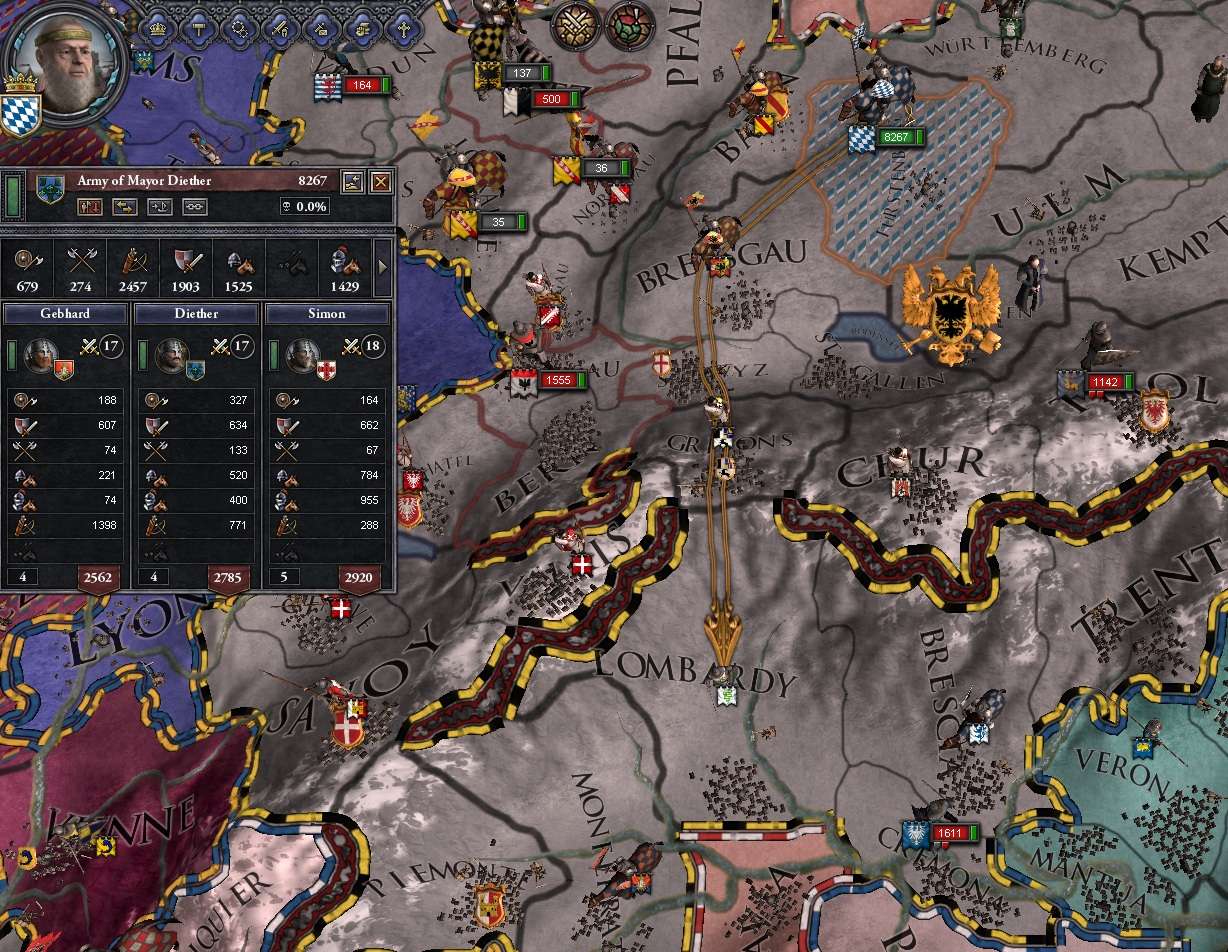
Diether had only recently been given his command. With Max staying behind, Gebhard wanted the most competent men he could find to cross the Alps and attack Pisa. Diether was a natural choice, as he'd served as a lieutenant for years before earning his father's post as Mayor. Gebhard trusted both subordinates with his life. He couldn't even always say that about his own brother, but he felt that way about Simon and Diether, after a few days of campaigning together. The army would concentrate at Lombardy, take on provisions in Milan, then resume the journey south.
Pisa didn't stand a chance.
13 December 1360, Nürnberg
Robert Capet sat, uncomfortably, in Max's seat at the head of the council table. The Herzog was attending to his newly pregnant wife, so he'd left his trusted Chancellor in charge. It was both a tremendous honor and a tremendous weight on his shoulders. He was the only man not of noble birth at the table. He was also the oldest by far, and the only foreigner.
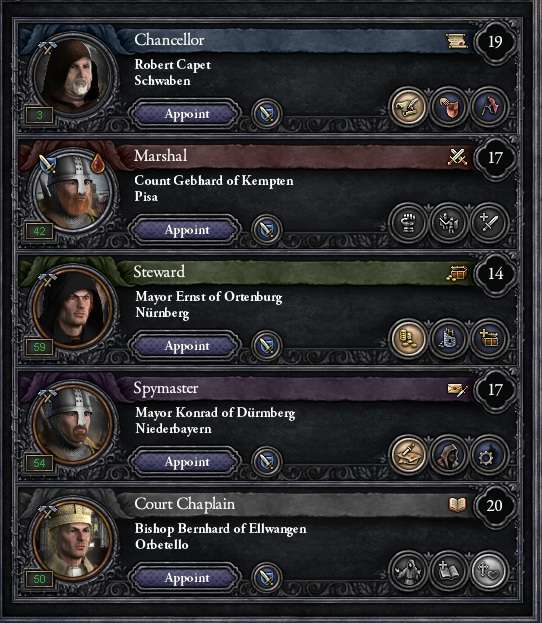
The newest member of the council was Bishop Bernhard, the Court Chaplain. He'd just returned from business with the Pope. Robert had been with the Kaiser, who'd kept his court in Schwaben despite the disruption of war. The Marshal rode as fast as he could to get back to Nürnberg from Pisa, and had yet to arrive. Only the Steward and Spymaster had been able to get to the castle quickly. Before Robert could address the Council with 1361's business, Gebhard threw the door open.
Robert Capet glared icily at Marshal Gebhard. "So glad you could join us, Marshal."
Gebhard took no notice of the Chancellor's tone, but excitedly slid a document across the table. "My lords, the Duke of Pisa has surrendered! We are once more at peace!"
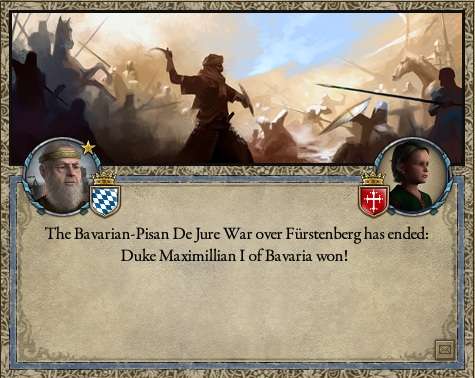
All of the day's business was shoved aside for celebrations. Robert remained outwardly irritated, but was celebrating himself on the inside.
And not just because of the peace, either.
25 July 1362, Schwaben
Although the Duchy of Schwaben belonged to the Hohenzollerns by law, Max was nonetheless an outsider when he met with Kaiser Christopher II in his palace. If the Pope had been Max's biggest supporter during his time of need, the Kaiser had been most suspicious of his most powerful vassal. Max had stood by Christopher when Christopher's brother Michael had tried to seize the throne by force, yet Max had refused to support the Kaiser's tightening of Crown Authority.
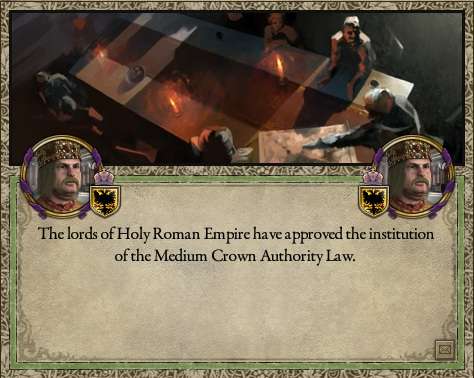
The measure had passed easily among every elector except Bayern. Max, quite frankly, had ambitions of holding a more regal crown than Herzog, but the Kaiser's decision to centralize his authority made that impossible. While Chancellor Robert had done everything he could to improve relations with the Kaiser, Christopher II more often than not refused to even see the Chancellor of Bayern, let alone speak with him. Max decided to patch things up on his own. While in Schwaben, he still had his own realm to worry about, and Max backed up a plot to seize the Duchy of Lombardy from Herzog von Tirol while simultaneously stopping Arnold of Medjerda of taking Schwaben from the Hohenzollerns. Max even sent 500 thalers to expand the keep of the Schloss von Hohenzollern.
After hours of discussions with the Kaiser and his court, Christopher reluctantly granted Max the ancient Roman title of Magister Equitum.
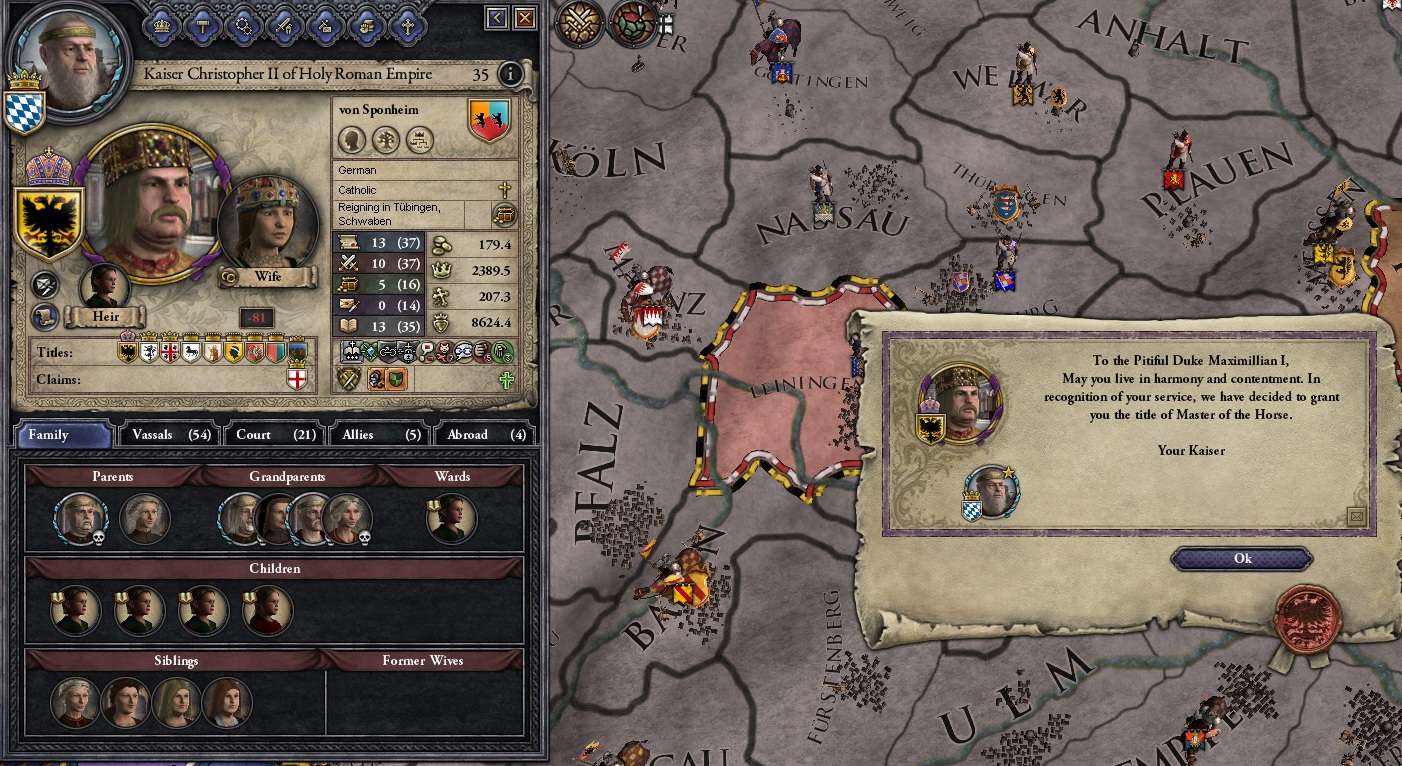
In exchange, Max used his offices with the Pope to lift the Kaiser's excommunication.
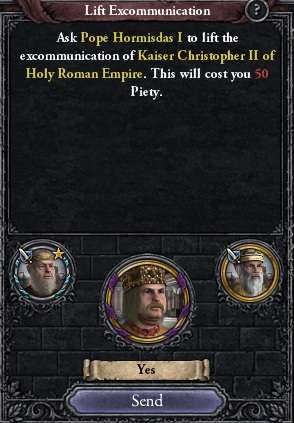
The Kaiser still didn't like Max. Christopher thought that Schwaben should be his, and Max's deceit and gluttony were very disappointing. Still, the relationship had improved immeasurably, which would let Max focus on his family.
20 March 1364, Schloss von Hohenzollern
Maximillian von Hohenzollern was the proudest of fathers on this day, the day his twins grew up. There had been a brief scare throughout the realm when the Pope excommunicated Max, but a substantial gift to the Vatican had that lifted within days of the sentence being passed.
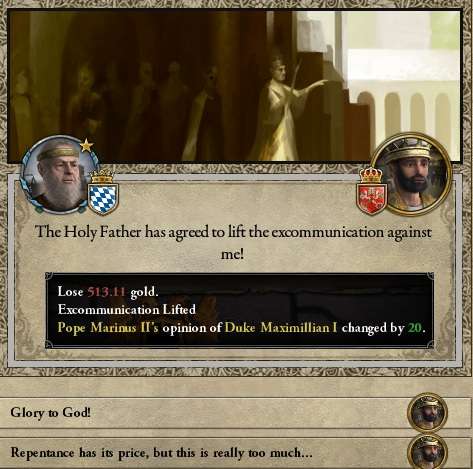
In no time at all, Max was able to see that Christine, Simon von Hohenzollern's youngest child, found a good husband in Prince Philipp, the Kaiser's son.
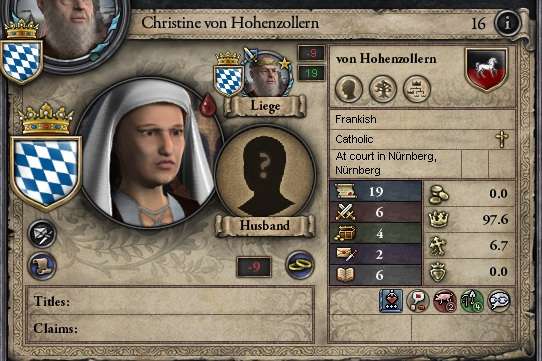
Only the most hateful Europeans still called Max "the Kinslayer"; while none had forgotten, most had forgiven him. Indeed, Max's charitable contributions to the Papacy had made him a paragon of virtue compared to some. Max spent most of 1363 and early 1364 playing with his son, Leopold.
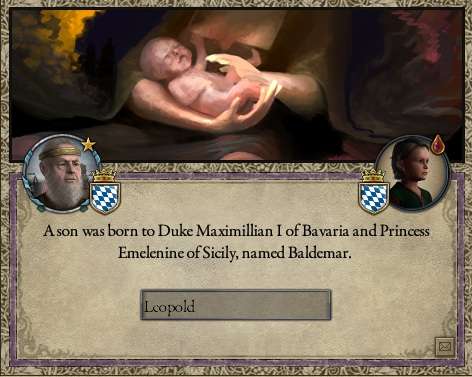
Most of Max's thirst for conquest had evaporated. He'd secured an impressive legacy for his children, and wanted to ensure all of them had a brilliant future.
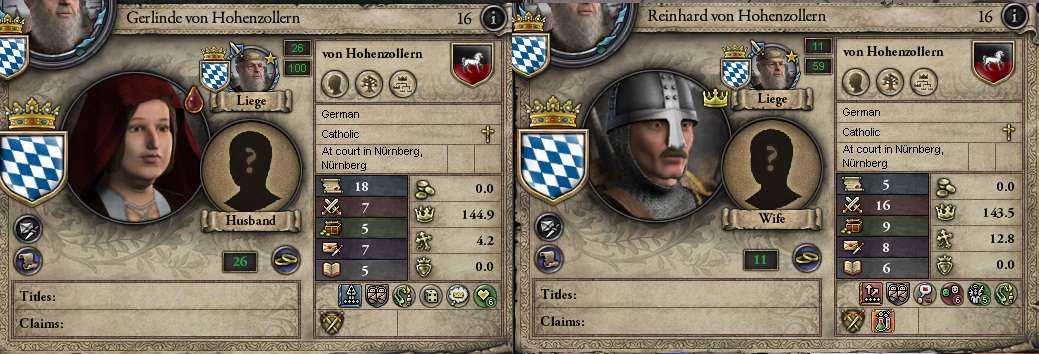
Reinhard, the elder twin by a few minutes, was a tall, brave, handsome warrior. He displayed none of his father's hedonism: he was content with his already formidable inheritance. His one character flaw was bitter envy for all those wealthier and more powerful than he. The list was short, thankfully, and his patience ensured that he kept his envy to himself, most of the time. He was betrothed to Grafin Trude of Aargau.
Gerlinde, his sister, did not have the guaranteed future that her brother did. She yearned to be a ruler in her own right, if not for her children. She was kind, but not always; one of the reasons Max didn't entirely trust her was her arbitrary nature. Still, she too found a good match in Orderic de Hauteville, Prince of Sicily. Even better, Orderic had agreed their marriage would be matrilineal, ensuring that the Hohenzollern traditions would continue.
As Max smiled at his children, he felt an inner peace. He had a multitude of sins -- nobody knew that better than him -- yet God had not cursed his family as a result. Instead, it had flourished and grown stronger. The new generation would not repeat the sins of their fathers, and lead the world into the 15th century.
That, at least, was what he prayed for every night.
We're going to have our final contest for this AAR, and the final three characters! (If for some reason, there aren't enough children left in the game, your character will appear in part 2 of the mega campaign.) Here are the three questions: please answer only if you've yet to claim a character.
1. Where is the Pope physically located?
2. In what year will Max die? (He is now 57.)
3. How many more children will he have?
Contest deadline is Friday at 10 PM (-6 GMT).
Long time reader, first time commenter here. You've spun a great narrative of a family's struggles for power and now the hassles with keeping it. It makes me want to give playing in the HRE another shot despite my annoyance at how the Crown Laws always end up maxed out.
Regarding your contests:
1. Well, your Chaplin is in Orbitello and he was Improving Relations so take the obvious (and probably wrong) choice and say Orbitello.
2. My pure guess is that Max will make it to 64, dying in 1371.
Regarding your contests:
1. Well, your Chaplin is in Orbitello and he was Improving Relations so take the obvious (and probably wrong) choice and say Orbitello.
2. My pure guess is that Max will make it to 64, dying in 1371.
Last edited:
1. Where is the Pope physically located?
2. In what year will Max die? (He is now 57.)
3. How many more children will he have?
1. Orbetello
2. 1365 or 1366
3. One.
2. In what year will Max die? (He is now 57.)
3. How many more children will he have?
1. Orbetello
2. 1365 or 1366
3. One.
A rich 57-year old influential Herzog marrying a 20-year young beautiful lady....
I'm sure it's love
I'm sure it's love

